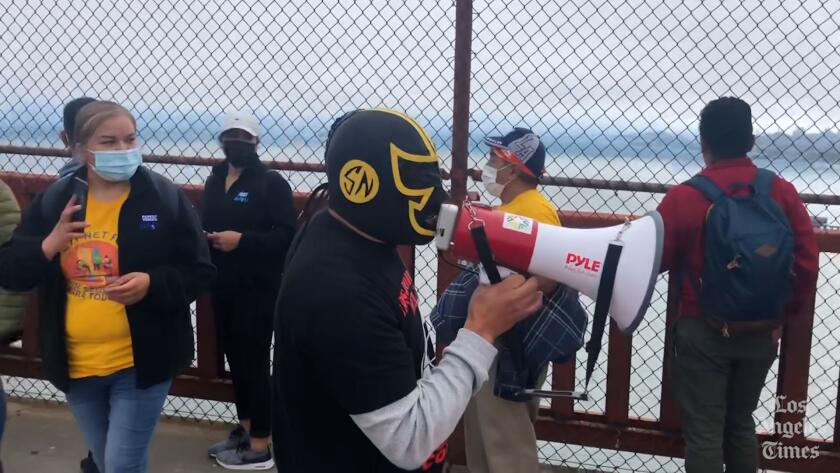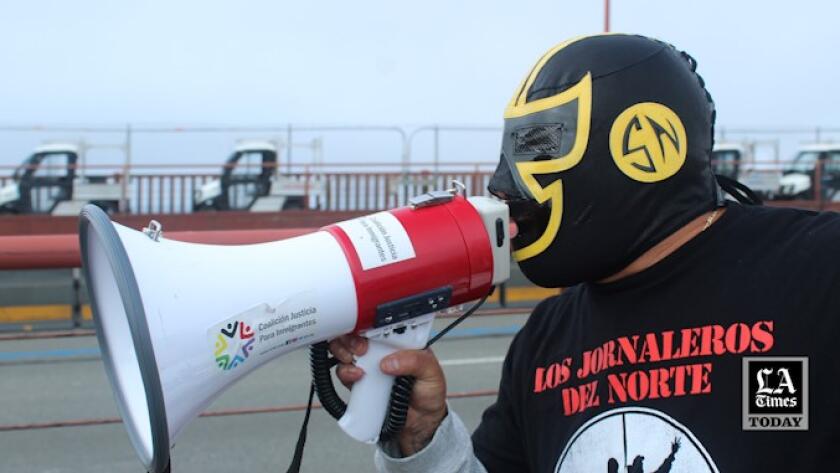A Mexican masked man fights for immigrant worker rights, in the streets and on the radio
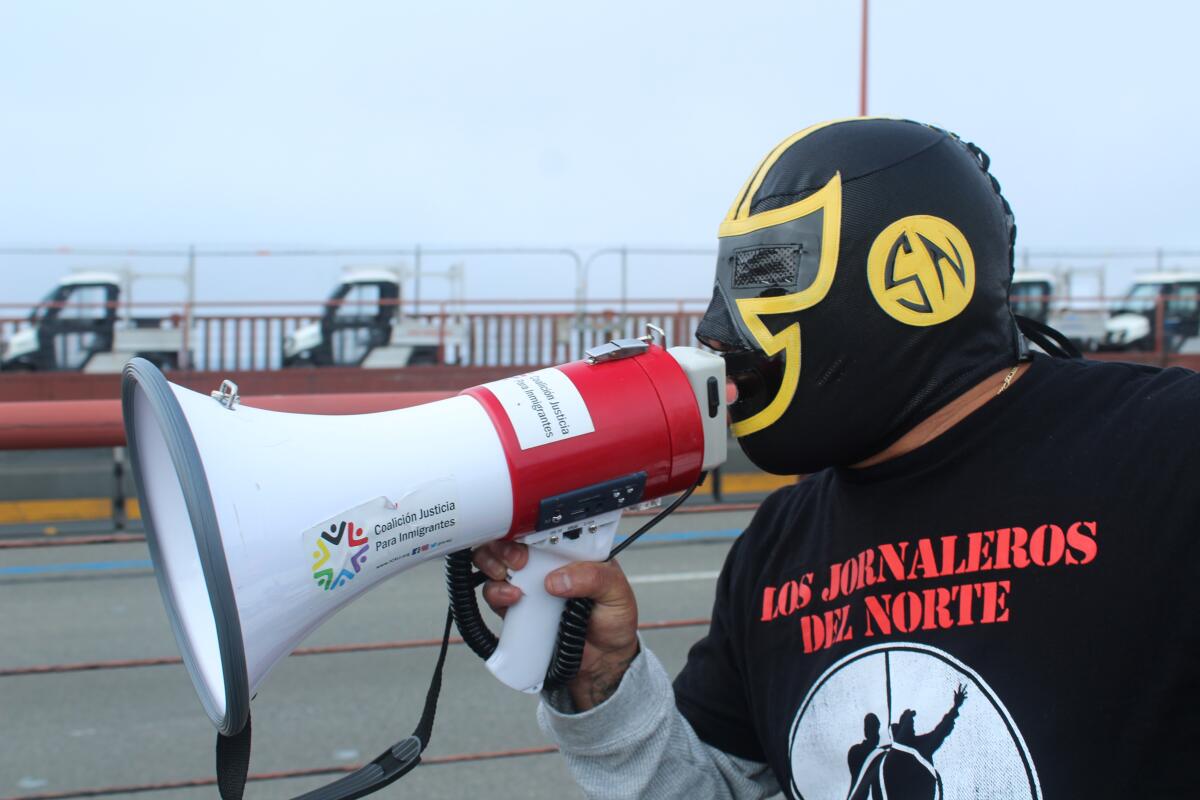
- Share via
On a typical day in years past, Luis Valentan was out chasing trucks by 5 a.m., jostling with other desperate men trying to land a job outside a Home Depot.
“Hey, take me! I work for a good price!” Valentan would plead amid an anxious chorus of foreign accents.
The immigrant from Mexico City was 25 when he became a day laborer, and immediately he began hearing co-workers talk about struggling to support a family, pay off debts and pull together enough money to cover medical bills and rising rents. Tales of wage theft, discrimination and verbal abuse circulated among his compañeros, especially those who lacked legal work documents.
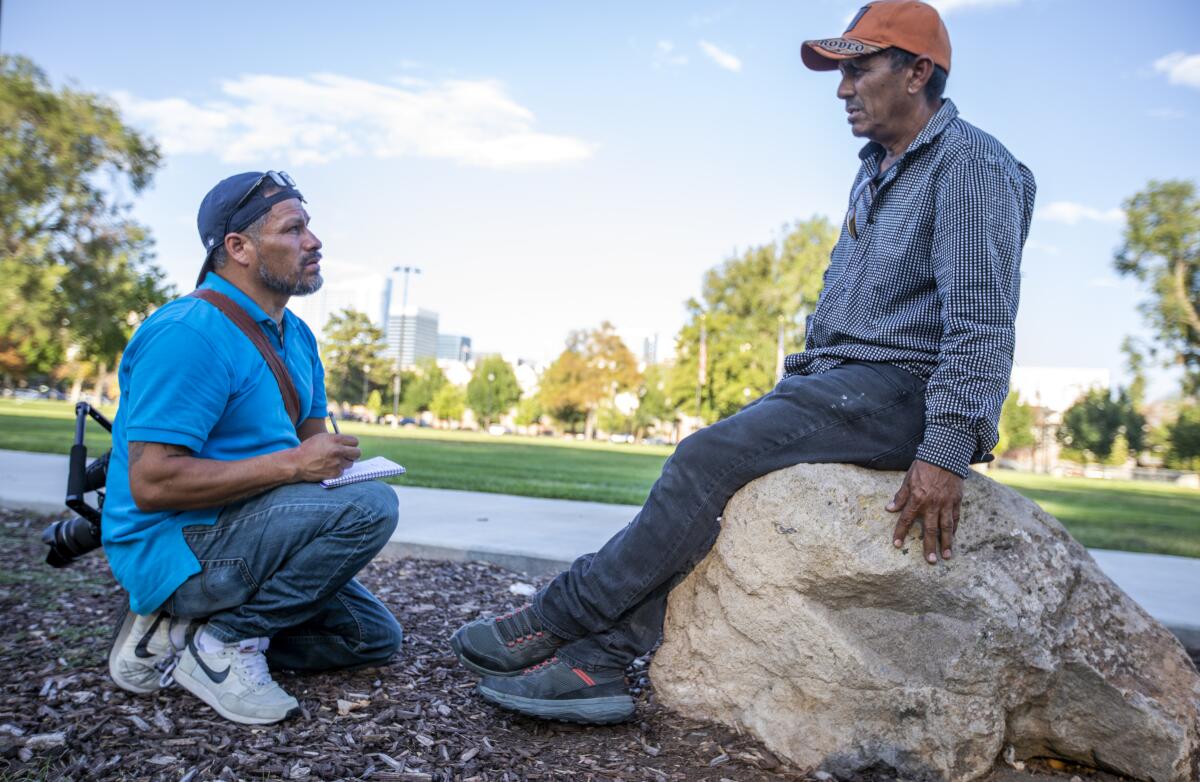
Valentan knew that somehow he had to help immigrants like himself. But how?
Two decades later, Valentan utilizes a curious pair of props to realize his goals as an immigrant labor activist: a microphone and a wrestler’s mask.
Every Friday morning at 11, he enters a radio booth at the Pasadena Community Job Center, turns on his transmission equipment, adjusts his microphone and fires up his two-hour radio show, “Voces Jornaleras,” Spanish for “Worker Voices,” or “Journeymen Voices.” His show is a cornerstone of the lineup at Radio Jornalera, an internet-based streaming platform that is a project of the National Day Laborer Organizing Network.
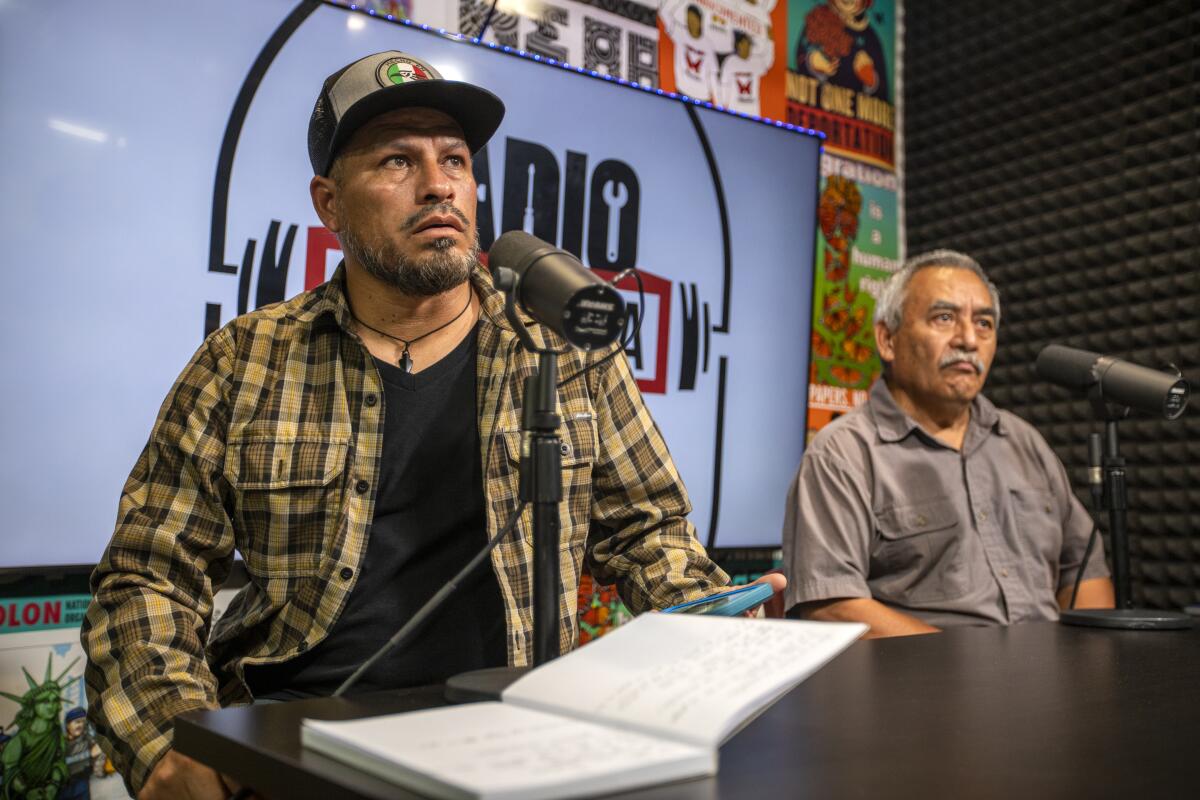
Wearing jeans, a red plaid shirt and a baseball cap with a Mexican flag logo one recent day, Valentan, 50, leaned into the mike as he welcomed listeners as if they were old friends. His arms and face were tanned from perpetually toiling in the sun, his fingers callused.
“Buenos días, compas y compitas,” he began, before launching into a passionate oration on the persistent problem of wage theft.
“Immigrants are already here,” Valentan said later in an interview. “Someone has to do the work and I have had to be the voice, taking advantage of the different communication platforms, if other media ignore us.”
- Share via
Luis Valentan emigrated from Mexico at age 18 in the mid-1990s and began working as a day laborer. Eventually he became an activist for immigrant rights and workers’ rights.
Valentan smiles at skeptics who doubt that he and his fellow immigrant laborers, without past experience or college training, could’ve created Radio Jornalera from scratch in mid-2019, in what was once a small warehouse. In just four years the station has expanded its programming from two hours a week to 24-7, and has branched into other states and even other countries.
But his ebullient on-air persona isn’t Valentan’s only public identity.
His alter ego is a luchador — a Mexican lucha libre, freestyle, wrestler — known as “Compa Ñero,” who barnstorms across California exhorting workers to demand and exercise their rights. “Compa Ñero” is a double wordplay in Spanish: Combined, the two words mean “friend” (compañero); separated, they form a shorthand for compadre ñero, an irreverent street person.
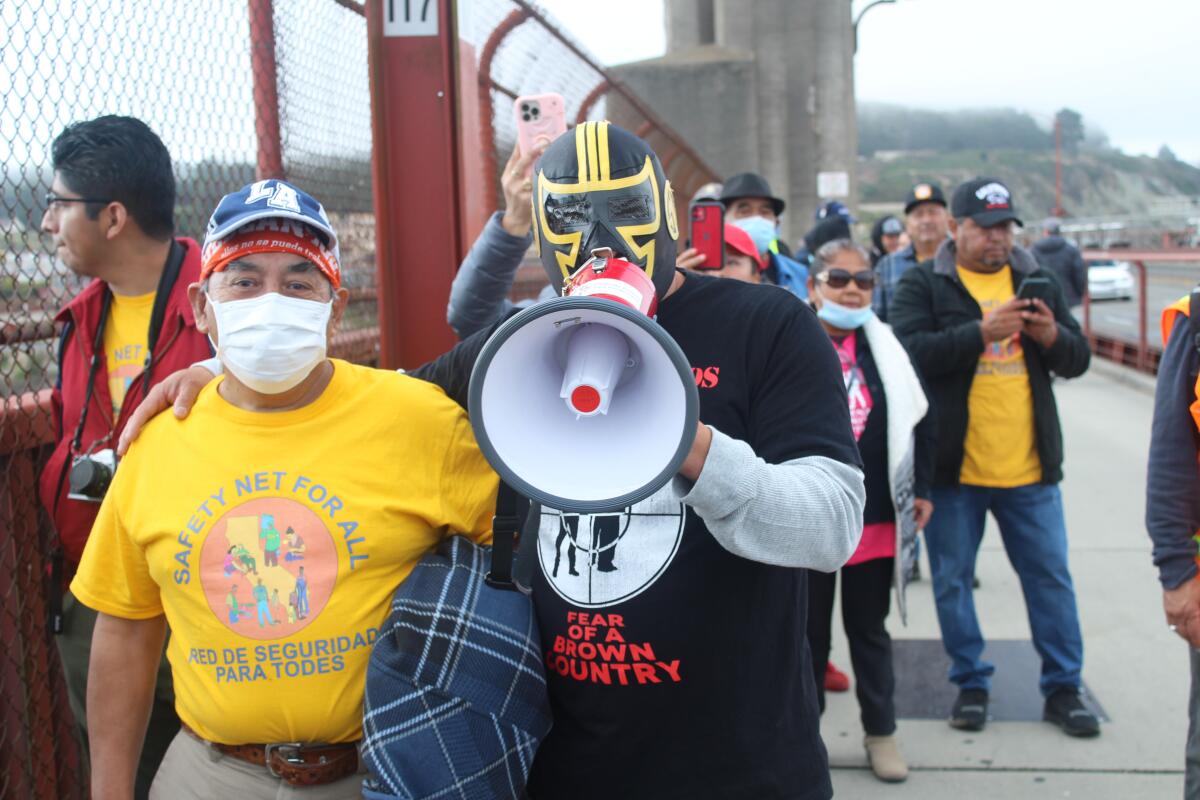
Wearing a yellow and black mask crowned with the letters “SN” — made famous in the 1970s and ‘80s by Vick Amezcua, aka Septiembre Negro, a 5’7” bundle of luchador fearsomeness — Compa Ñero is rarely seen at the radio station. His domain is the streets, where he often takes part in protest marches and political actions, educating and uniting his community with jokes and colorful slang.
“The problems of the immigrant community, especially day laborers, are not learned at the university,” Valentan said. “You need to see them and live them to understand them.”
According to the National Day Laborer Organizing Network (NDLON), there are between 120,000 and 150,000 men and women working as day laborers in at least 22 U.S. states. Broadcasting on YouTube and Facebook, Radio Jornalera helps callers get legal and other professional advice —not only with wage theft and wage recovery but also with on-the-job accidents and injuries, discrimination, immigration and visa concerns, as well as COVID- and other health-related matters.
Lilia García Brower, the California labor commissioner who oversees the main law enforcement agency for workplace protections, said that Radio Jornalera has been an essential force in stemming wage theft. In 2021, California workers filed nearly 19,000 claims totaling more than $338 million in stolen wages, according to a database provided by the labor commissioner’s office.
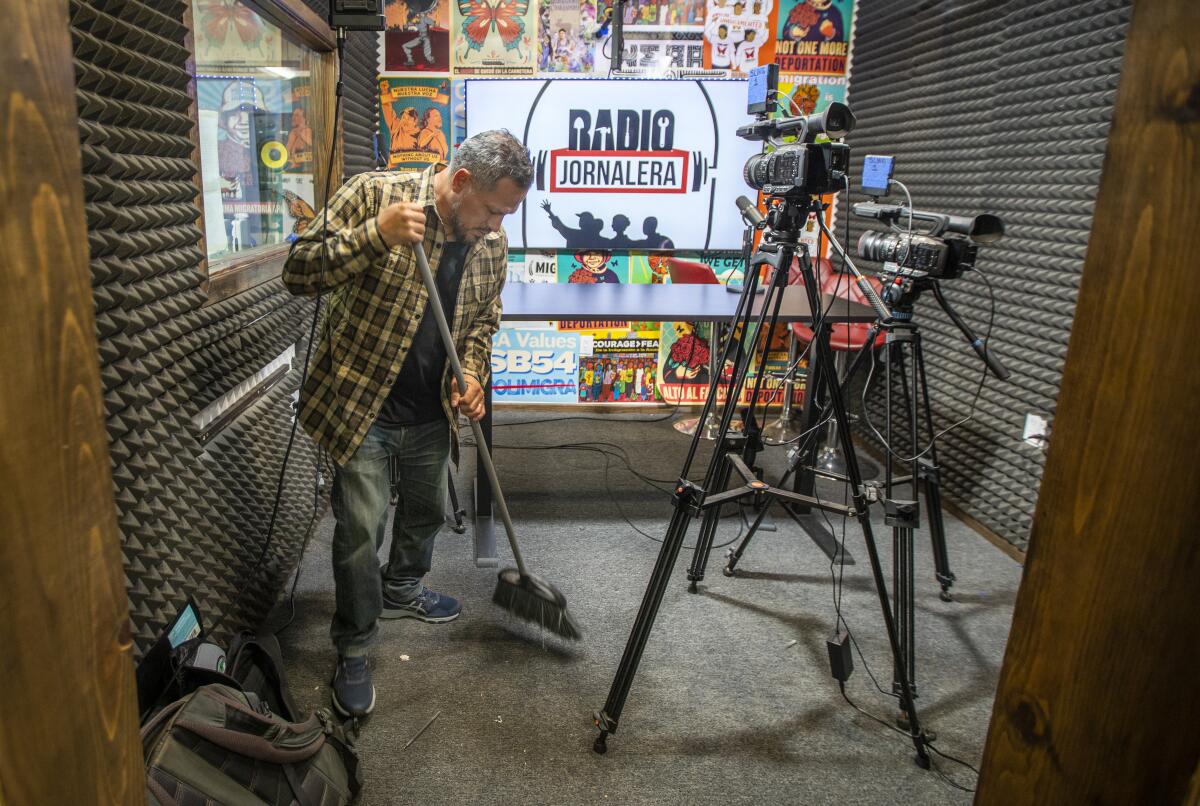
“Wage theft is a systemic problem in California,” García Brower said. “We do not have exact data, but we know that it is in the billions. In Los Angeles County specifically it is identified that each week approximately $26 million is looted from workers.”
On one recent radio show, José Luis Rodríguez, a 64-year-old immigrant day laborer from Mexico City who looks for work outside a Home Depot in Azusa, called in to say that he hadn’t been fully paid for a 2021 house-painting job.
The homeowner was ignoring his pleas for payment, Rodríguez said. “When the days passed and he stopped answering me, I knew that he had stolen from me. I felt sad, and like a fool.”
The Baldwin Park resident took his case to Radio Jornalera, which he knew from its public service advertisements for local food banks. Valentan tried to contact the homeowner, but his phone calls weren’t answered. The homeowner also didn’t respond to a Times reporter’s repeated phone calls.
According to attorney Cal Soto, coordinator of workers’ rights for NDLON, Rodríguez subsequently filed a complaint in Van Nuys with the California Labor Commissioner’s Office, also called the Division of Labor Standards Enforcement, seeking back pay for two days’ work — a total of $300 — plus a fine of up to $6,000 for alleged wage theft. The case could take two years or more to resolve.
Rodríguez also was able to receive training in wage theft prevention, financial aid and food assistance. He now volunteers at the Pasadena Job Center. “I feel stronger, with more self-esteem, after all this,” he said.
Valentan said that in addition to empowering workers such as Rodríguez, Radio Jornalera’s mission is to erase common prejudices against day laborers, who often are caricatured as low-skilled, unreliable migrants illegally in the United States. He hopes his luchador character can inspire.
“We immigrants need someone who identifies with us. A ring fighter is a character that always attracts everyone’s attention.”
::
One afternoon in 1981, Valentan said goodbye to his mother and set off for the United States. He arrived in South Los Angeles a few days later. He was 18.
With no high school education, he cleaned toilets and later worked in the garment industry. He shared an apartment with 10 others. Sometimes he slept in a closet.
In 1998 he became a day laborer, rising at 5 a.m. to unload trailers, shovel cement, work a sewing machine and tend gardens. Employers favored the young, the strong, the low-paid — those who didn’t complain about degrading pay, sore backs and dislocated arms, verbal haranguing and sexual harassment. They feared they’d be deported if they did.
“I saw and experienced a lot of injustice,” Valentan says. “We have no choice but to shut up and put up with the mistreatment if we want to earn the day’s pay.”
While living in Arizona for eight years in the early 2000s, he overlapped with Arizona’s passage in 2010 of highly controversial Senate Bill 1070, which barred state and local officials and agencies from curtailing federal immigration laws; imposed penalties on anyone sheltering, hiring or transporting people who are in the U.S. illegally; and empowered police departments to question the immigration status of detainees, including those stopped for simple traffic violations. Critics said it would lead to racial profiling and civil rights violations.
Valentan became involved with the immigrant-rights organization Promise Arizona. When he returned to Los Angeles in 2012, he was a committed activist and a trained community organizer.
“You can’t just complain all your life,” he said. “You also have to get involved with your community to make a change.”
Back in L.A., he worked to highlight immigrants’ stories through the Voces Mobiles Day Labor Project of the Instituto de Educación Popular del Sur de California (IDEPSCA), a nonprofit that organizes and educates immigrants to solve problems in their own communities. In 2015, he began contributing to a twice-monthly, one-hour radio program, Voces Jornaleras — the same as its current — in a previous iteration on KPFK-FM (90.7), joined by fellow activist Manuel Vicente from NDLON. After Donald Trump was elected, the pair felt further spurred to counter the new administration’s anti-immigrant policies.
When an opportunity arose to broadcast the show out of the Pasadena Community Job Center, they seized it. There now are nine different shows and a total of 14 program announcers.
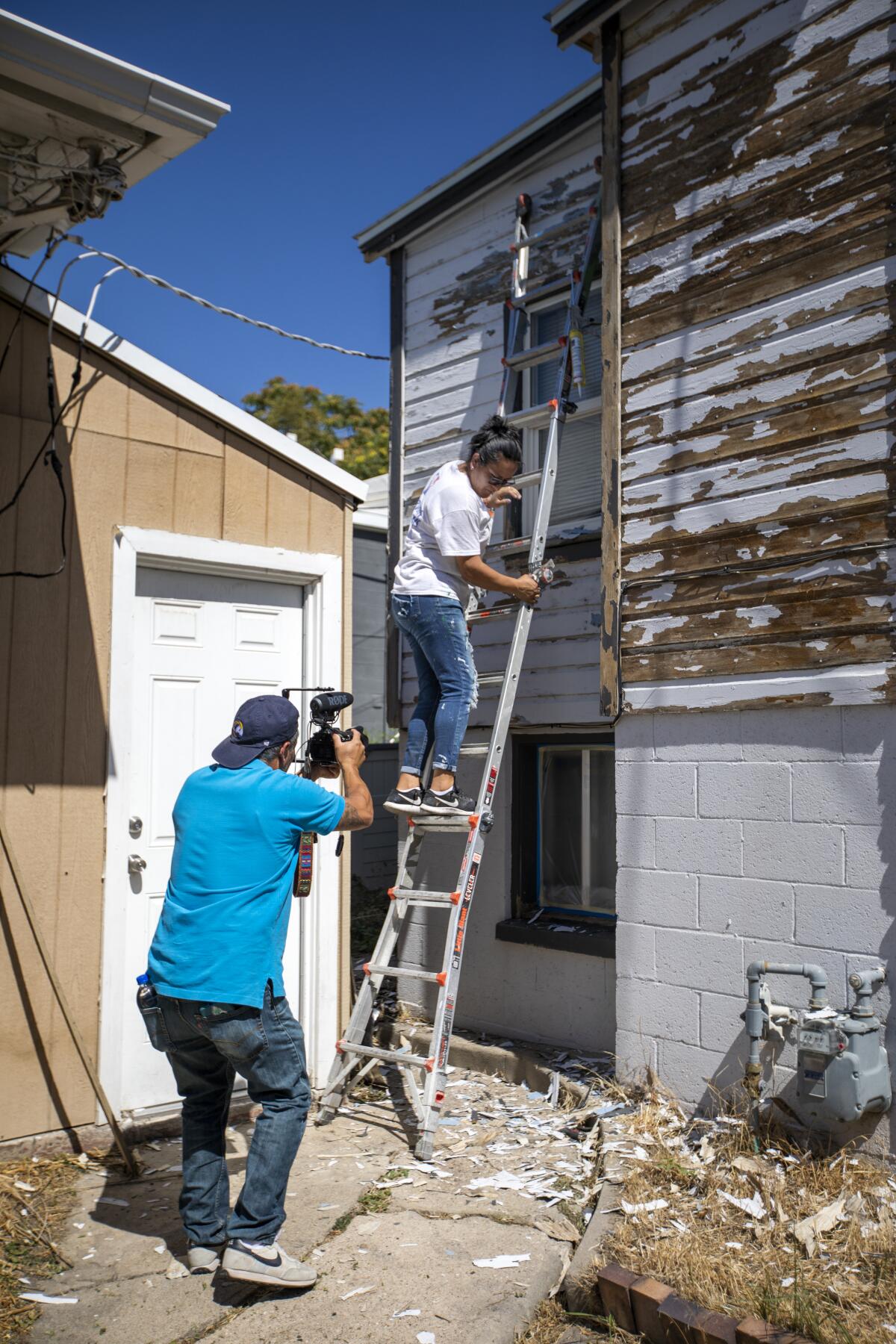
“The goal was not only to inform and entertain day laborers, but to give them a tool that trains them as activists and organizes them from the roots up,” says Vicente, a Mexico native who holds a degree in communication sciences from the Jesuit University of Guadalajara. “Out there, there are many news platforms that report on certain issues, with the minutes counted. Here, we have as much airtime as possible, without limitations.”
Rosa Sánchez, 63, was among those who asked Voces Jornaleras for support. The Pasadena cleaning worker became a widow on Jan. 30, 2021, when her husband, José, a cook, died after the couple fell ill from the coronavirus.
“I was left without a husband, without a job and still with bodily pain due to the disease,” said the native of Jalisco, Mexico. “Mr. Valentan listened to my case and his team directed me to a food bank that continues to help me.”
The outbreak of the COVID-19 pandemic brought enhanced recognition of the essential work performed by the day-labor sector. Even so, because of their immigrant status many of these workers have struggled to access the economic support provided to U.S. citizens.
“Day laborers, like all migrants, carry the American dream in their minds, and many were unable to achieve their dreams after dying on the line,” Valentan said.
That type of awareness has spurred day laborers and essential workers in other parts of the country, in league with activists, to bring Radio Jornalera into their communities. Among the platform’s new partners are Unión de Vecinos, an organization that addresses housing laws and rights; El Baúl de los Recuerdos, which mixes regional Mexican music with reports on immigrant issues; Alianza TPS, which covers news about immigrant relief services; and Freedom Sing, which broadcasts music associated with immigrant-rights movements.
Elizabeth Blaney, co-founder of Union de Vecinos, said it was important to have an extra public platform that aligns with the immigrant community on both longstanding and emerging issues.
“Online platforms have become a traditional avenue for all working people who want to educate themselves, join activism or fight for their rights,” Blaney said.
The Unión de Vecinos program has been on the air since 2020, every Monday at 11 a.m..
“When you hear other people claiming your rights, you start to want to do the same. Radio Jornalera injects people with that feeling of unity and activism,” Blaney said.
The Radio Jornalera format has been replicated in Minnesota, Boston, New York, New Jersey, Washington, El Salvador and Guatemala. For the last several months, Valentan also has been broadcasting his show from Salt Lake City, to expand the platform’s presence throughout the West. In November, Radio Jornalera became established in Costa Rica, and this year it is expected to expand to Florida and Texas.
Angela Sanbrano, co-executive director of NDLON, is proud of Radio Jornalera’s dramatic growth.
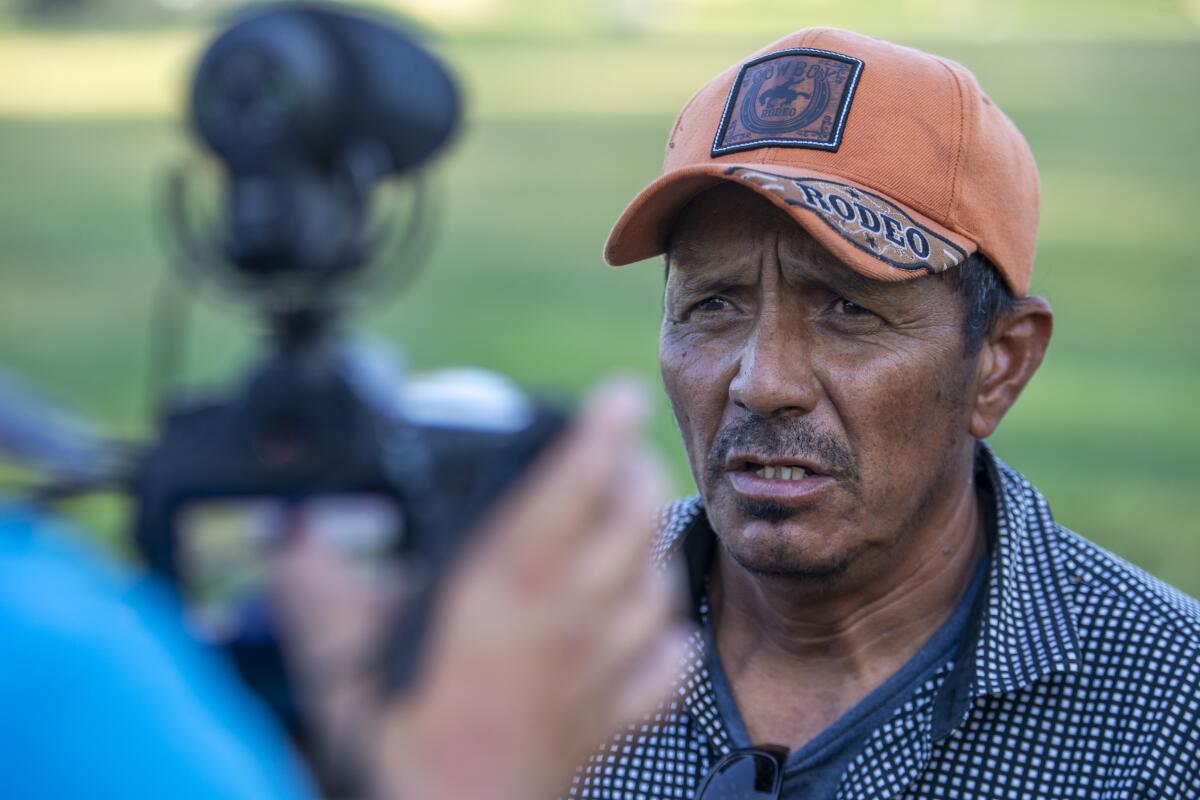
“Day laborers have countless jobs that keep Californians’ lives and the nation afloat on a daily basis, and yet almost no one writes about them unless they are hurt or ripped off,” she said.
Victor Narro, project director and professor of labor studies for the UCLA Labor Center, said the day-laborer community has come a long way since the 1990s, at least in California.
“In the 1990s, day laborers were attacked from different angles. They were pointed out for interfering with businesses, for interfering with public roads, and even groups of neighbors argued that day laborers were interfering with the aesthetics of their neighborhoods. There were cities that put rules to limit day laborers from congregating in public places, and this is still happening,” he said.
“Little by little the day laborers came together, fought for their rights, educated people, and they continue to do so in one way or another,” he said. “There is going to come a time when Congress has to move forward with an immigration reform package, and we have to make sure that day laborers are at the table, in any immigration reform package and in any policies, because nobody wants to see them, but they continue to use their services.”
Valentan and Vicente, for their part, aren’t taking time to savor Radio Jornalera’s achievements. Although the technology evolves, immigrant workers’ hopes for a better future stay constant.
“Only the tools have changed,” Valentan said, “but the desire to work has not changed.”
- Share via
Watch L.A. Times Today at 7 p.m. on Spectrum News 1 on Channel 1 or live stream on the Spectrum News App. Palos Verdes Peninsula and Orange County viewers can watch on Cox Systems on channel 99.
More to Read
Inside the business of entertainment
The Wide Shot brings you news, analysis and insights on everything from streaming wars to production — and what it all means for the future.
You may occasionally receive promotional content from the Los Angeles Times.
